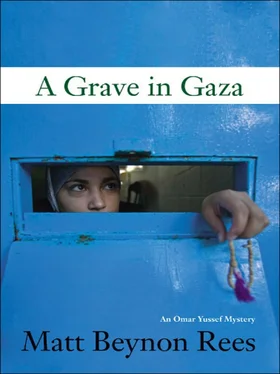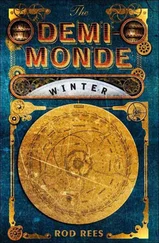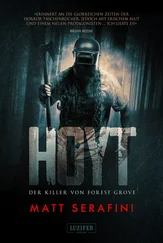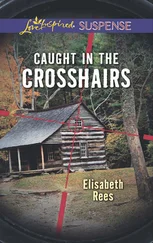Matt Rees - A grave in Gaza
Здесь есть возможность читать онлайн «Matt Rees - A grave in Gaza» весь текст электронной книги совершенно бесплатно (целиком полную версию без сокращений). В некоторых случаях можно слушать аудио, скачать через торрент в формате fb2 и присутствует краткое содержание. Жанр: Криминальный детектив, на английском языке. Описание произведения, (предисловие) а так же отзывы посетителей доступны на портале библиотеки ЛибКат.
- Название:A grave in Gaza
- Автор:
- Жанр:
- Год:неизвестен
- ISBN:нет данных
- Рейтинг книги:5 / 5. Голосов: 1
-
Избранное:Добавить в избранное
- Отзывы:
-
Ваша оценка:
- 100
- 1
- 2
- 3
- 4
- 5
A grave in Gaza: краткое содержание, описание и аннотация
Предлагаем к чтению аннотацию, описание, краткое содержание или предисловие (зависит от того, что написал сам автор книги «A grave in Gaza»). Если вы не нашли необходимую информацию о книге — напишите в комментариях, мы постараемся отыскать её.
A grave in Gaza — читать онлайн бесплатно полную книгу (весь текст) целиком
Ниже представлен текст книги, разбитый по страницам. Система сохранения места последней прочитанной страницы, позволяет с удобством читать онлайн бесплатно книгу «A grave in Gaza», без необходимости каждый раз заново искать на чём Вы остановились. Поставьте закладку, и сможете в любой момент перейти на страницу, на которой закончили чтение.
Интервал:
Закладка:
“That’s only a minor scandal.”
“Then why did they torture Masharawi for exposing it?”
“Because torture is a minor punishment in Gaza.”
“I think there’s a link between the torture of Masharawi for exposing the fake degrees, and the stolen Saladin I missile.” Omar Yussef laced his fingers together and held them close to Khamis Zeydan’s face. The two men were almost touching. “If so, Magnus’s kidnapping and James’s murder are connected, too.”
“You said Lieutenant Fathi Salah’s degree wasn’t faked. But he’s the one who was trading the missile and is now dead, not his brother Yasser. So you’ve got a guy with a degree who was selling a missile and another guy with a bogus degree who wasn’t. How does that give you a connection? And what does it have to do with the killing of James Cree?”
“If I knew all that, I wouldn’t be arguing about it with you. I’m still trying to figure it out, but I’m certain there’s a connection.” Omar Yussef looked out of the smoked-glass window at the crowd below. He imagined them surging up the stairs to lynch him. He turned to his friend. “What do you know about websites?”
“What’re you talking about?”
“If someone made a website for me, would just anyone be able to get inside the computer and look at it?”
Khamis Zeydan coughed out a short, scoffing laugh. “ Get inside the computer? My brother, you’re behind the times. Are you still cleaning your teeth with the bristly end of a miswak twig?”
The delegates jockeyed for position near the door. Professor Adnan Maki entered, his arm hooked through the well-tailored sleeve of Colonel Mahmoud al-Fara. Khamis Zeydan took a deep drag on his cigarette and crushed the butt under his shoe on the carpet. “The undertaker has arrived,” he said.
Omar Yussef strained to see through the tobacco smoke. The crowd drew faintly toward Colonel al-Fara, like nervous children approaching a big dog. Al-Fara acknowledged the men he passed with a vicious, superior smile. He wore a light gray suit, a white shirt whose cuffs came an inch beyond the sleeves of the jacket to expose gold cufflinks, and a somber silk tie. His lank, black hair fell over his forehead and his mustache was gleaming and moist. He slouched through the room dispensing mirthless grins. He brought a tissue from his pocket and expectorated. The coffee boy put out a hand and al-Fara gave him the crumpled tissue without looking at him.
Maki caught sight of Omar Yussef. His smile wavered, then he lifted his hand and wiggled his fingers in greeting. Omar Yussef searched for a sign that Maki had noticed the Saladin Brigades leaflet and his handwritten notes on the floor of his office. The professor’s sybaritic lips twitched as though blowing a kiss. He went with al-Fara out of the back of the conference room to a wide balcony. The other men followed.
The Marche Slav was close. The band’s ponderous measures punctuated a new level of hysteria in the crowd at the front of the building. The musicians came to the open yard at the back of the presidential compound and marched across a broad yellow circle painted on the concrete as a helicopter landing pad. Two men carried the bass drum and another gave it the beat with a bulbous stick he held in two hands. Behind them, a jeep brought General Moussa Husseini’s casket, wrapped in the Palestinian flag. Red-bereted troopers leaned out of the jeep, shielding the coffin, deflecting the thrashing arms of people in the crowd who managed to reach over the cordon of soldiers. The people threw their arms in the air and chanted that they would sacrifice for Husseini, whom they called a martyr.
“Do the idiots think he died for Allah?” Omar Yussef muttered. “A martyr?”
Khamis Zeydan lifted an eyebrow at that. “Jihad is a very flexible concept,” he said.
The jeep reached the clear space behind a double row of troops and, as the band stepped to the side, it circled to the corner of the yard. Two ranks of Military Intelligence troopers rested their rifle butts at ease against their heels, forming a lane to the grave. They came to attention.
The party men on the balcony trotted down the steps to the yard and crossed the yellow paint of the helicopter pad. An imam waited at the graveside, his hands crossed in front of him, wearing a long brown robe and a white turban wrapped around a scarlet fez. The imam lifted his chin from his chest and stroked his short gray beard, as Omar Yussef and Khamis Zeydan moved grimly toward the grave. The delegates dropped their cigarettes as they left the helicopter pad and stepped into the sand by the fence, where Husseini was to be laid to rest. The imam led them in the funeral prayer. The troopers in the back of the jeep lifted Husseini’s body from the open coffin and brought him, wrapped in two white cloths, to the graveside. Omar Yussef considered the rituals of burial, the traditional washing of the corpse that was omitted for a martyr because the manner of his death purifies him. A martyr would be buried with blood on his face, where it sprayed from his wound, and dirt under his fingernails, where he clawed the ground in agony. He wondered what the men who wrapped Husseini in his shroud had done about the feces in the general’s underpants.
When they handed Husseini down into the grave, his skin was tinted light green against the white sheet that circled his face. The corpse looked small, dropping out of sight, but a soldier inside the grave had to struggle as he maneuvered Husseini’s tubby body onto its right side, so that it would rest facing Mecca. The imam’s prayer urged those present to praise Allah and consider the reward to which the dead man went. Omar Yussef thought that Husseini had already received his reward for a violent, cruel life, and that it had been a machine-gun magazine emptied into his spine and his bowels voided into his underpants. Further weighing of eternal balances was unnecessary.
The prayers were barely done when the Revolutionary Council leaders turned back to the presidential building. Behind them, the two ranks of Military Intelligence men fired volleys over the grave. Maki made a joke and al-Fara gave an exhausted smile. He glanced toward the crowd and his languid slouch tensed. His expression switched to fear and then to anger.
The mob was breaking through the cordon at the side of the building. People rushed across the concrete with their fists raised, heading for the grave. Al-Fara turned to the armed funeral detail for protection, but the soldiers retreated behind the grave and made no move toward the party men.
The delegates of the Revolutionary Council hurried on old legs for the safety of the presidential building. A black Audi roared from the side of the paved lot. The back door opened and al-Fara jumped in. The crowd flowed toward it. A window dropped and one of al-Fara’s guards aimed a pistol into the air. He fired off a few rounds and the car sped around the far side of the building.
The head of the crowd came to the grave and halted, pumping fists in the air and chanting to Allah. To reach the graveside, the mass of people at the back of the crowd looped quickly to the side. Their swing caught Omar Yussef as he fell behind the dignitaries escaping into the president’s building. He saw Khamis Zeydan turn and shout to him, just as the crowd enveloped him.
The force of the swarm took him a few paces sideways, setting him off balance, and he couldn’t counter its momentum. He fell onto his right knee. He put his hand to the ground to keep from falling further. Someone trod on his fingers. He cried out, but he dared not move the hand. If he went down, he’d be trampled to death. A man put his knee in Omar Yussef’s shoulder and tumbled over him. The man came down on his back and rolled a few times as the mob kicked him into the hard surface of the president’s helicopter pad.
Читать дальшеИнтервал:
Закладка:
Похожие книги на «A grave in Gaza»
Представляем Вашему вниманию похожие книги на «A grave in Gaza» списком для выбора. Мы отобрали схожую по названию и смыслу литературу в надежде предоставить читателям больше вариантов отыскать новые, интересные, ещё непрочитанные произведения.
Обсуждение, отзывы о книге «A grave in Gaza» и просто собственные мнения читателей. Оставьте ваши комментарии, напишите, что Вы думаете о произведении, его смысле или главных героях. Укажите что конкретно понравилось, а что нет, и почему Вы так считаете.












